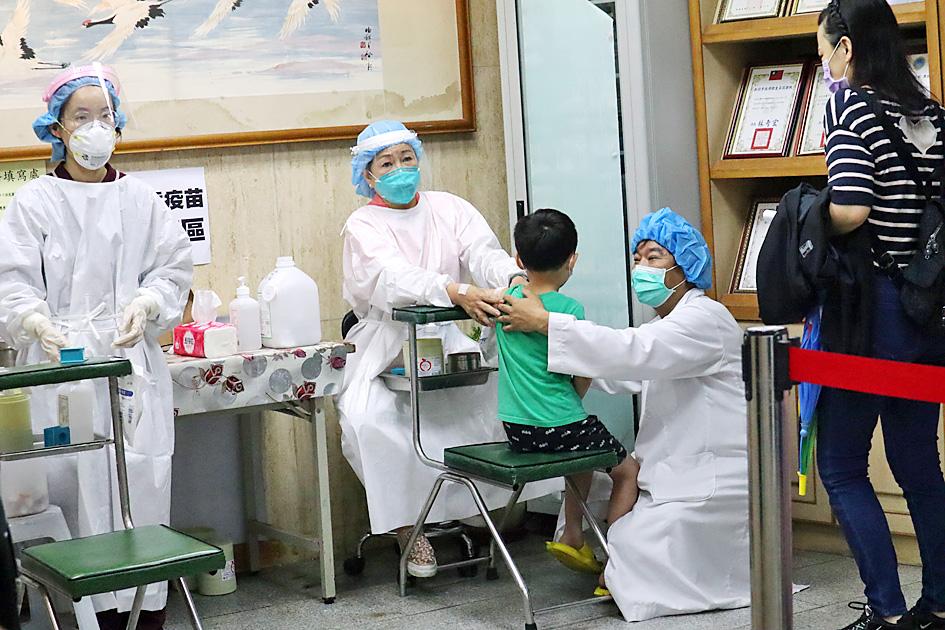The benefits of COVID-19 vaccines outweigh the risks for children between six months and five years old, the Central Epidemic Command Center (CECC) said yesterday, as it also announced that the first Novavax vaccine shipment is to arrive today.
Minister of Health and Welfare Chen Shih-chung (陳時中), who heads the center, said the first shipment of the Moderna vaccine for young children was to arrive this morning, but due to minor document issues, delivery has been slightly postponed.
Lee Ping-ing (李秉穎), convener of the Ministry of Health and Welfare’s Advisory Committee on Immunization Practices (ACIP), told the CECC’s daily news briefing about the commission’s approval of the COVID-19 vaccine for children aged six months to five years.

Photo: Chou Hsiang-yun, Taipei Times
Although vaccine approval for children can differ by country, epidemiological data suggest that the risk from COVID-19 infection in young children — such as multisystem inflammatory syndrome in children (MIS-C) infection-induced encephalitis — is higher than the seasonal flu, Lee said.
Vaccination is still effective for reducing the risk of severe illness or death after COVID-19 infection, he added.
The recommended dosage is a two-dose primary series — 0.25mL per dose (50 micrograms of mRNA) — administered at least four to eight weeks apart, he said, adding that children who have contracted COVID-19 should get vaccinated at least three months after the onset of symptoms or the date of diagnosis.
The recommended site of vaccination for children under the age of two is in the vastus lateralis muscle of the anterolateral thigh, while the deltoid muscle in the upper arm of the non-dominant hand is recommended for children over the age of two, he said.
Common side effects of vaccination are crying, restlessness, pain at the infection site, sleepiness, fever, and a rash or swelling at the vaccination site, Lee said, adding that the side effects are generally milder for children than for adults.
However, if children following vaccination have a fever for more than 48 hours, or develop a serious allergic reaction — such as difficulty breathing, shortness of breath, dizziness, a rapid heartbeat, a rash over the entire body — they should see a doctor so that the cause can be determined, he added.
Myocarditis and pericarditis are serious, but very rare side effects after receiving an mRNA vaccine, especially among adolescent males, Lee said, adding that while the risk in children under the age of five is lower than in adolescents, parents should still watch for symptoms.
If symptoms — such as chest pain, chest tightness or discomfort, heart palpitations, decreased exercise tolerance, fainting or shortness of breath — develop within 28 days after vaccination, medical attention should be sought immediately, he said.
However, as young children might have trouble verbalizing discomfort, parents should also watch out for symptoms such as vomiting, a pale face, cold sweats, loss of appetite or fatigue, which can be caused by reduced blood pressure, Lee added.
The CECC and local governments are establishing vaccination sites for young children, Chen said, adding that the center has encouraged sites to be open in the evenings and on weekends, and for vaccinations to be administered at preschools or infant care centers.
The first Novavax vaccine shipment of 504,000 doses is to arrive today, with vaccinations starting on Friday next week or earlier, Chen said.
At its meeting on Monday, the ACIP also recommended that workers at airports, harbors, quarantine facilities and social welfare facilities, as well as airline crew members, receive a second booster shot, with an interval of at least five weeks after the first booster.
This priority group can receive their second booster shot from tomorrow, Chen said yesterday.

The inspection equipment and data transmission system for new robotic dogs that Taipei is planning to use for sidewalk patrols were developed by a Taiwanese company, the city’s New Construction Office said today, dismissing concerns that the China-made robots could pose a security risk. The city is bringing in smart robotic dogs to help with sidewalk inspections, Taipei Deputy Mayor Lee Ssu-chuan (李四川) said on Facebook. Equipped with a panoramic surveillance system, the robots would be able to automatically flag problems and easily navigate narrow sidewalks, making inspections faster and more accurate, Lee said. By collecting more accurate data, they would help Taipei

STATS: Taiwan’s average life expectancy of 80.77 years was lower than that of Japan, Singapore and South Korea, but higher than in China, Malaysia and Indonesia Taiwan’s average life expectancy last year increased to 80.77 years, but was still not back to its pre-COVID-19 pandemic peak of 81.32 years in 2020, the Ministry of the Interior said yesterday. The average life expectancy last year increased the 0.54 years from 2023, the ministry said in a statement. For men and women, the average life expectancy last year was 77.42 years and 84.30 years respectively, up 0.48 years and 0.56 years from the previous year. Taiwan’s average life expectancy peaked at 81.32 years in 2020, as the nation was relatively unaffected by the pandemic that year. The metric

TAKING STOCK: The USMC is rebuilding a once-abandoned airfield in Palau to support large-scale ground operations as China’s missile range grows, Naval News reported The US Marine Corps (USMC) is considering new sites for stockpiling equipment in the West Pacific to harden military supply chains and enhance mobility across the Indo-Pacific region, US-based Naval News reported on Saturday. The proposed sites in Palau — one of Taiwan’s diplomatic allies — and Australia would enable a “rapid standup of stored equipment within a year” of the program’s approval, the report said, citing documents published by the USMC last month. In Palau, the service is rebuilding a formerly abandoned World War II-era airfield and establishing ancillary structures to support large-scale ground operations “as China’s missile range and magazine

Passengers on Taiwan High Speed Rail (THSR) will be required to use headphones and make phone calls in gangways under new “quiet travel” rules starting Sept. 22. THSR Chairman Shih Che (史哲) told media that THSR will run a three-month promotional campaign to ensure widespread adoption of the new rules. Those repeatedly ignoring the guidance face the potential termination of their transport contract, which can result in them getting escorted off the train, according to THSR. Shih shared his hope to cultivate an environment conducive to rest and reading for the train’s passengers, stating that these changes aim to “promote self-discipline” among passengers